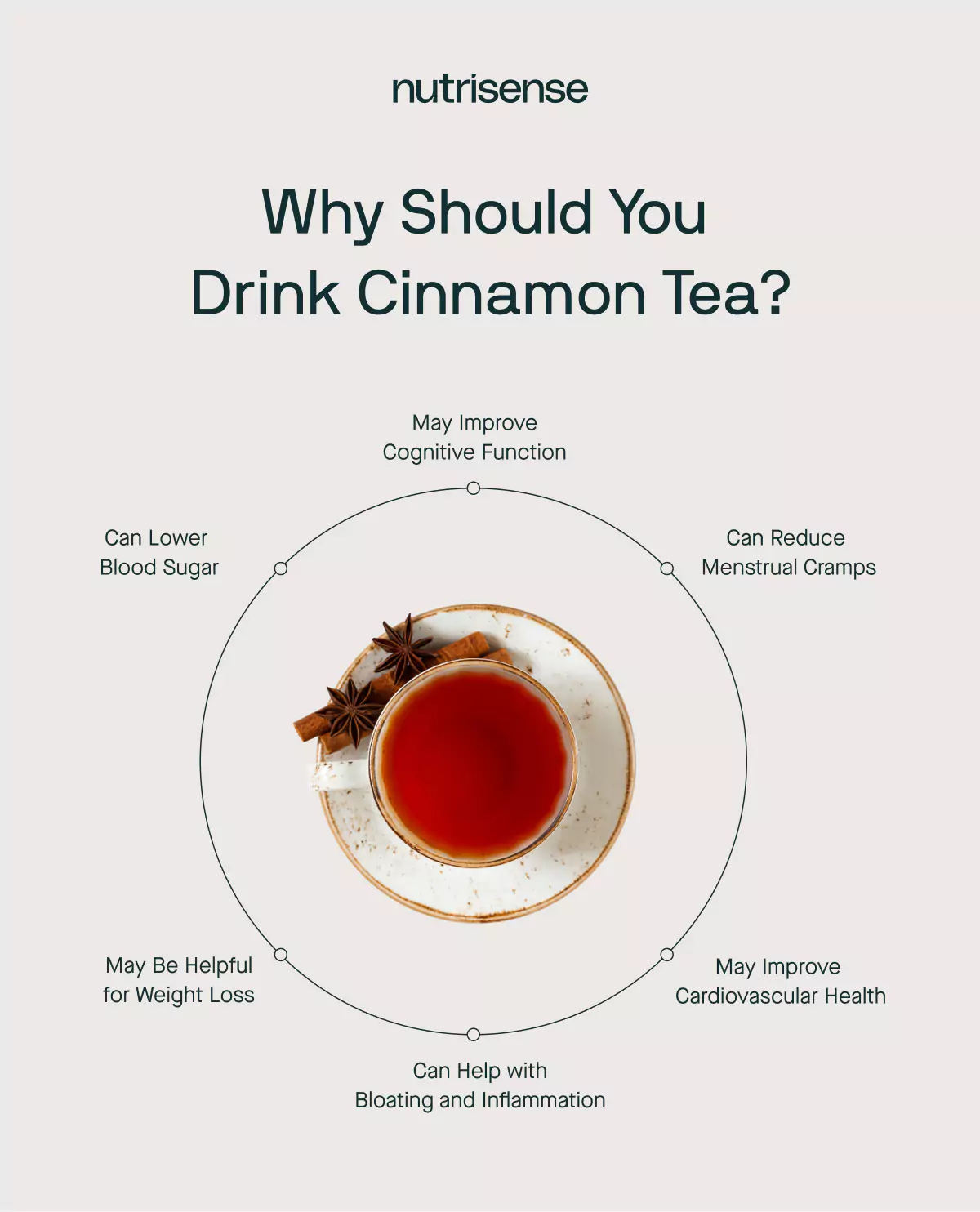Cinnamon Tea Benefits: Weight Loss, Blood Sugar, and More

Key Takeaways
If you’re a tea lover, you may know that teas are a great way to reap the benefits of herbs and spices. While herbal teas are commonly known for soothing a sore throat, you may be surprised to learn that cinnamon tea can also support your immune system and overall health.
Packed with powerful antioxidants, cinnamon offers a range of health benefits, from supporting blood sugar levels with anti-diabetic properties to anti-inflammatory potential. But does cinnamon tea have the same benefits? And how much cinnamon should you consume as part of a healthy diet? Let’s dive in to find out.
Is Cinnamon Healthy?
.webp)
Cinnamon is an aromatic spice from the cinnamon tree that has been used in cuisines worldwide for centuries. This versatile spice's history dates back to 2800 BC when it was used for medicinal purposes.
Today, cinnamon sticks and ground cinnamon are staples in many households, prized for their warm, rich flavor. Thanks to its active compounds, Cinnamon has numerous health benefits beyond its culinary uses.
Types of Cinnamon
Did you know there are multiple varieties of cinnamon? Here are the four main types of cinnamon:
- True cinnamon is also commonly called Ceylon cinnamon or Mexican cinnamon. The scientific name for Ceylon cinnamon is Cinnamomum zeylanicum.
- Indonesian cinnamon, which also goes by the scientific name Cinnamomum burmanni
- Vietnamese cinnamon, which also goes by the scientific name Cinnamomum loureiroi
- Cassia cinnamon or Chinese cinnamon, which also goes by the scientific name Cinnamomum aromaticum.
Each type has unique qualities, but all offer potential health benefits, including:
- Anti-inflammatory properties
- Blood sugar regulation
- Antioxidant effects
- Potential anti-cancer properties (in vitro studies)
- Antibacterial and antifungal effects
If you’re unfamiliar with cooking with cinnamon, a great way to start adding this spice to your diet is to start drinking cinnamon tea.
Making a cup of cinnamon tea is as easy as placing a few cinnamon sticks into hot or boiling water and letting it steep for a few minutes. While it’s good any time of the year, it’s particularly good during the colder months.
8 Benefits of Cinnamon Tea

If you still need a little convincing to add more of this spice into your diet, let’s take a look at eight of the most well-researched health benefits of cinnamon tea.
Can Lower Blood Sugar
Cinnamon tea benefits your metabolic health by supporting healthy blood sugar levels. This is because the antioxidant properties of cinnamon tea, which come from the polyphenols found in this spice, are thought to help lower post-meal glucose.
Biomedical researcher Dr. Steve Gendron adds, "It may lower blood sugar levels by improving insulin sensitivity. This means it may help your body better use its own insulin to move sugar from your blood into your cells, where it's needed for energy."
One study on Indonesian cinnamon, or Cinnamomum burmannii, examined cinnamon's effects on blood sugar levels in nondiabetic individuals. The authors found that those who consumed cinnamon tea had slightly lower postprandial blood glucose levels.
May Improve Cardiovascular Health
Cinnamon tea has also been shown to have cardioprotective properties in animal studies. The antioxidants found in cinnamon might help the body fight off free radicals that can damage tissue and lead to chronic diseases like heart disease. However, more human studies are needed.
Many components of cinnamon have been shown to reduce blood pressure, triglycerides, and LDL cholesterol levels, which can also support heart health. Another study found that consuming cinnamon led to a significant decrease in systolic blood pressure.
By supporting metabolic health and improving insulin sensitivity, this spice may also help reduce the risk of developing type 2 diabetes, a risk factor for cardiovascular disease.
Cinnamon May Help with Weight Loss

Another metabolic benefit of cinnamon tea is its link to weight loss. A meta-analysis investigating the effects of cinnamon tea on weight loss and obesity found multiple studies supporting its benefits for weight loss.
These studies found that cinnamon tea consumption could affect obesity levels. This benefit may also stem from cinnamon's ability to improve insulin sensitivity, which can help with healthy weight regulation.
It Can Reduce Menstrual Cramps
Many people experience discomfort or symptoms such as cramps, bloating, and brain fog during their period. Cinnamon tea may help alleviate some of the symptoms of menstrual pain.
One study found that consuming cinnamon not only alleviated menstrual cramping and pain significantly but also led to a significant reduction in menstrual bleeding, nausea, and vomiting.
The next time you experience menstrual cramps, drinking cinnamon tea may help you cope with this unpleasant feeling.
It Might Support Collagen Formation
There is some limited evidence that cinnamon might support collagen formation. Collagen can support healthy skin, bones, ligaments, tendons, and hair, among many other things.
A study investigating the effects of cinnamon consumption on collagen production found that cinnamon may increase the amount of type I collagen. However, more studies are needed.
It May Help Prevent Certain Cancers

Cinnamon is commonly known for its metabolic and cardiovascular benefits, but some have suggested it also contains anticancer properties. In vitro cell culture studies have shown that Cinnamon cassia can cause tumor or cancer cells to die without affecting normal cells.
However, it’s important to note that these are in vitro studies and not in vivo. How a living human body metabolizes cinnamon differs greatly from an in vitro cell culture. We do not yet have enough evidence to suggest cinnamon has in vivo anti-cancer properties.
It May Improve Cognitive Function
Cinnamon might also boost brain function and cognitive health. Notably, animal studies have shown it to support memory function.
In a study done on rats, scientists investigated the effect of cinnamon on memory. The authors found that consuming cinnamon led to better memory and recognition.
Cinnamon may affect cognitive function in a few different ways:
- Cinnamon contains antioxidants and other phytochemicals that can improve the brain’s ability to glucose for optimal function.
- It may reduce harmful factors such as oxidative stress, impacting brain function.
Cinnamon may reduce insulin resistance, which can reduce certain brain changes caused by Alzheimer’s disease, and help improve the brain’s insulin signaling.
Can Help with Bloating and Inflammation

Last but certainly not least, cinnamon tea may help reduce bloating and inflammation. Cinnamon's anti-inflammatory properties are connected to compounds known as 2′-hydroxycinnamaldehyde, cinnamaldehyde, and cinnamic acid.
One study found that the anti-inflammatory properties of 2′-hydroxycinnamaldehyde come from its ability to stop the production of nitric oxide, a harmful and inflammatory molecule. It’s important to note that this study was in vitro and not in vivo.
However, one in vivo study suggested that consuming cinnamon significantly improves GI symptoms in individuals with dyspepsia.
Nutrisense Dietitians Answer Some FAQs About Cinnamon Tea
Can You Drink Cinnamon Tea Every Day?
While cinnamon tea can benefit your overall health, it may not be a good tea to consume large amounts of daily. This is because a compound in Cassia cinnamon called coumarin may be hepatotoxic or toxic to the liver.
This compound can damage the liver by increasing total serum bilirubin, reducing prothrombin time, and leading to necrosis. In some cases, excessive consumption of cinnamon can also lead to elevated oxalate levels.
To be safe, experts recommend a daily cinnamon intake of less than 0.1 milligrams per kilogram of body weight.
Who Should Not Drink Cinnamon Tea?

Due to the potential effects of cinnamon on the liver, you should limit or avoid consuming cinnamon if you have or are at risk for developing any liver condition.
If you're prone to kidney stones, try avoiding cinnamon or, at the very least, be cautious about how much you consume. Cinnamon can also interact with certain medications, such as statins, leading to unwanted side effects.
If any of these scenarios apply to you, you will want to discuss cinnamon consumption with your doctor or a registered dietitian before you start drinking cinnamon tea.
When Should You Drink Cinnamon Tea?
While you should stick to caffeinated drinks such as coffee and black tea in the morning, you can enjoy cinnamon tea at any time of day! Try adding a cup to your afternoon routine at work or using it as a relaxing bedtime beverage in the evening.
If you want to reap cinnamon’s benefits to help improve your postprandial glucose response, you may also consider drinking your cinnamon tea around meal times.
When adding new foods to your diet, find the time that works for you, your unique body, and your schedule!
Can Cinnamon Tea Help with Weight Loss?
Yes, as we mentioned above, it may help with weight loss for some, in addition to other factors such as caloric intake, activity levels, etc. Studies suggest it may support weight loss by improving insulin sensitivity and reducing obesity markers.
What are Some Other Ways to Add Cinnamon to Your Diet?

Not a fan of tea? No problem—here are some other ways to consume more cinnamon and get some of these great health benefits:
- Try adding a pinch of cinnamon to savory dishes. Whether it’s a sweet potato casserole or even a hearty pot roast, adding a teaspoon of cinnamon can add a unique, rich flavor to your meal.
- Add cinnamon powder or extract to your smoothies. Try blending simple ingredients like vanilla protein powder, bananas, cinnamon powder, peanut butter, and almond milk for a delicious, blood-sugar-friendly snack.
Use cinnamon as your finishing touch. If you’re making a Greek yogurt parfait, try topping it off with cinnamon powder instead of sugar or honey for a touch of sweetness.
Find the right Nutrisense programto turn insight into progress.
Find What Works for Your Body with Nutrisense
Enjoying cinnamon tea is just one way to support your health, but what about creating a sustainable lifestyle plan tailored to your unique needs? That’s where a registered dietitian can make all the difference.
At Nutrisense, our dietitians go beyond basic nutrition advice. They help you understand your body’s signals, like blood sugar patterns, and how they relate to your meals, snacks, and even drinks like cinnamon tea.
You can learn to balance nutrients, support your metabolism, and integrate tools like CGM technology to uncover what truly works for you with proper guidance. As a dietitian, I often recommend incorporating mindful strategies to align with your goals—better energy, improved focus, or weight management. Start with our quiz to see how Nutrisense can support your health.
Go Beyond Glucose Data with Nutrisense
Your glucose can significantly impact how your body feels and functions. That’s why stable levels are an important factor in supporting overall wellbeing. But viewing glucose isn't enough. Nutrisense, you’ll be able to learn how to use your body's data to make informed lifestyle choices that support healthy living.
One-to-one coaching
Sign up to access insurance-covered video calls to work with a glucose expert: a personal registered dietitian or certified nutritionist who will help tailor your lifestyle and diet to your goals.
Monitor and measure what matters
With the Nutrisense CGM Program, you can monitor your glucose with health tech like glucose biosensors and continuous glucose monitor (CGM)s, and analyze the trends over time with the Nutrisense App. This will help you make the most informed choices about the foods you consume and their impact on your health.
Find your best fit
Ready to take the first step? Start with our quiz to find the right Nutrisense program to help you take control.

Amanda is a Nutrition Manager and Registered Dietitian, with a Masters in Dietetics from Stephen F. Austin State University. Originally from south GA, she got her undergrad degree from Texas Tech University. She worked at a hospital in Fort Worth, TX, for 4 years as a dietitian, counseling those living with HIV.




